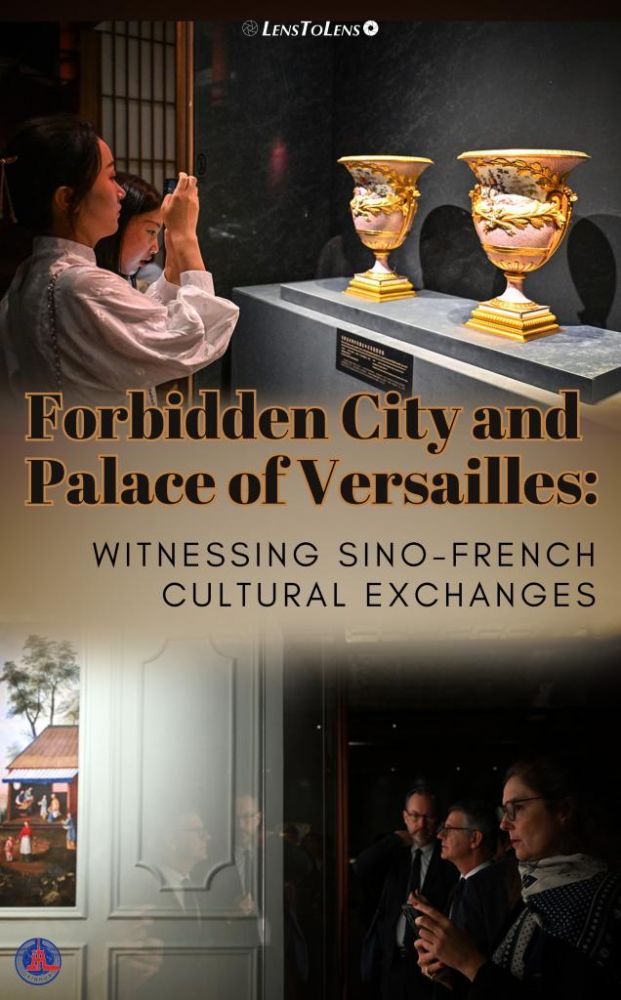
BEIJING, May 18 -- An exhibition jointly held by the Palace Museum and the Palace of Versailles, focusing on the exchanges between China and France in the 17th and 18th centuries, kicked off on April 1 in Beijing.
The exhibition, themed "The Forbidden City and the Palace of Versailles," is a key project in the China-France Year of Culture and Tourism in 2024, which marks the 60th anniversary of diplomatic relations between China and France.
The second half of the 17th century and the 18th century are regarded as a golden age for exchanges between the Chinese and French courts and cultural exchanges between the two countries. The exhibition features about 200 works from the collections of the two museums and other institutions to highlight the political and cultural relationship between China and France during the period.
The exhibition is open to the public until June 30.
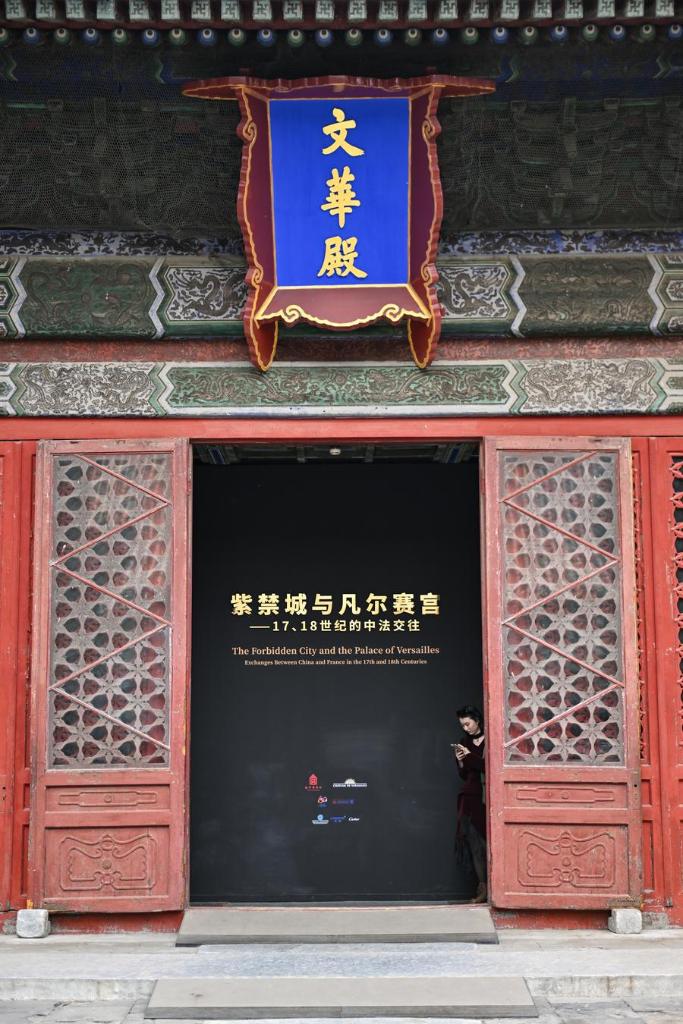 This photo taken on April 26, 2024 shows the exhibition "The Forbidden City and the Palace of Versailles: Exchanges Between China and France in the 17th and 18th Centuries" at the Palace Museum in Beijing, capital of China. (Xinhua/Sun Ruibo)
This photo taken on April 26, 2024 shows the exhibition "The Forbidden City and the Palace of Versailles: Exchanges Between China and France in the 17th and 18th Centuries" at the Palace Museum in Beijing, capital of China. (Xinhua/Sun Ruibo)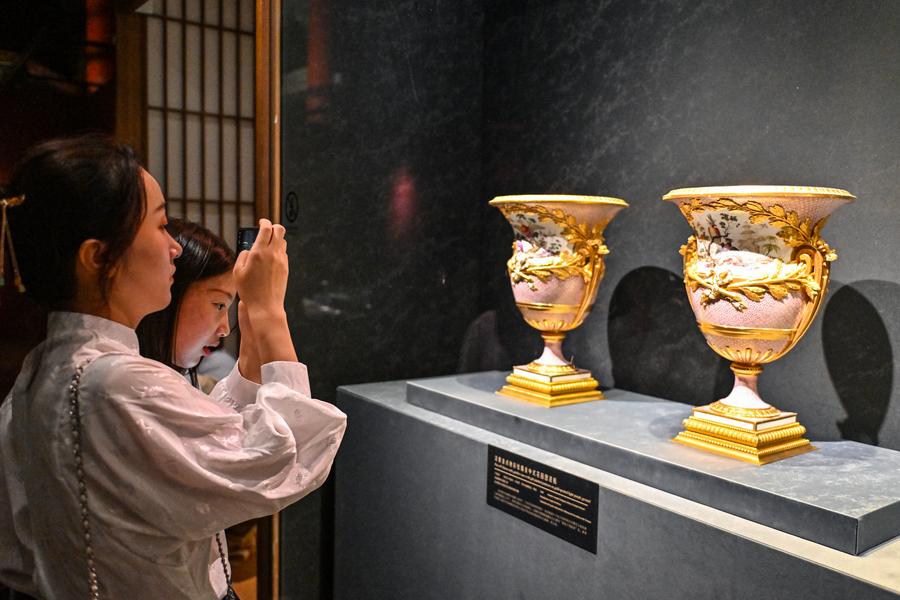 Visitors view the exhibition "The Forbidden City and the Palace of Versailles: Exchanges Between China and France in the 17th and 18th Centuries" at the Palace Museum in Beijing, capital of China, April 26, 2024. (Xinhua/Sun Ruibo)
Visitors view the exhibition "The Forbidden City and the Palace of Versailles: Exchanges Between China and France in the 17th and 18th Centuries" at the Palace Museum in Beijing, capital of China, April 26, 2024. (Xinhua/Sun Ruibo)Visitors view the exhibition "The Forbidden City and the Palace of Versailles: Exchanges Between China and France in the 17th and 18th Centuries" at the Palace Museum in Beijing, capital of China, April 1, 2024. (Xinhua/Jin Liangkuai)
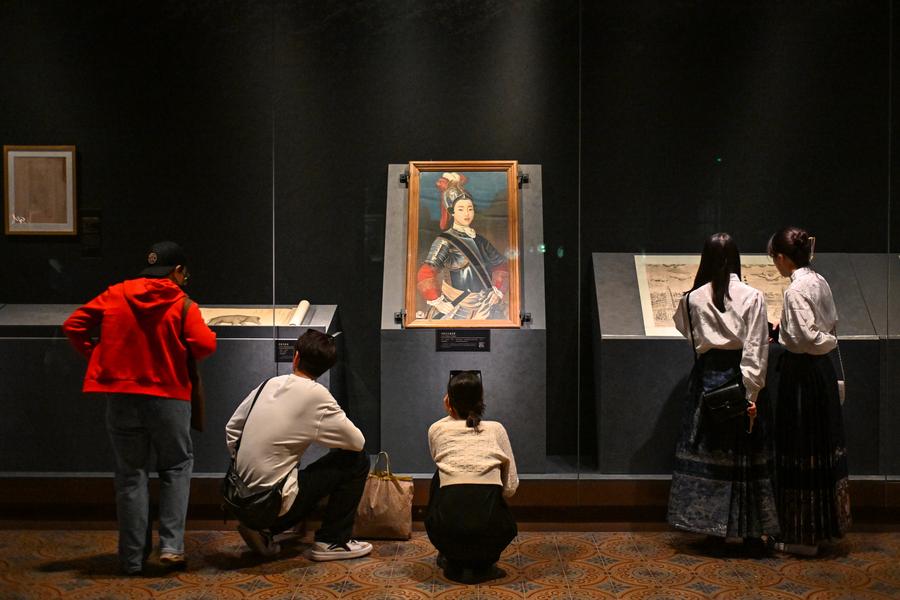 Visitors view the exhibition "The Forbidden City and the Palace of Versailles: Exchanges Between China and France in the 17th and 18th Centuries" at the Palace Museum in Beijing, capital of China, April 26, 2024. (Xinhua/Sun Ruibo)
Visitors view the exhibition "The Forbidden City and the Palace of Versailles: Exchanges Between China and France in the 17th and 18th Centuries" at the Palace Museum in Beijing, capital of China, April 26, 2024. (Xinhua/Sun Ruibo)A pocket watch is displayed during the exhibition "The Forbidden City and the Palace of Versailles: Exchanges Between China and France in the 17th and 18th Centuries" at the Palace Museum in Beijing, capital of China, April 1, 2024. (Xinhua/Jin Liangkuai)
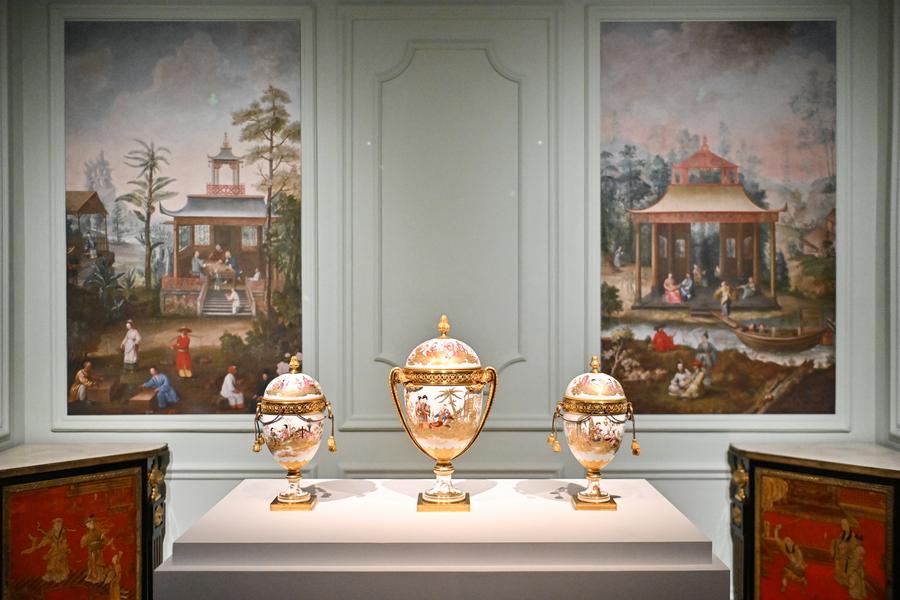 Exhibits are pictured during the exhibition "The Forbidden City and the Palace of Versailles: Exchanges Between China and France in the 17th and 18th Centuries" at the Palace Museum in Beijing, capital of China, April 26, 2024. (Xinhua/Sun Ruibo)
Exhibits are pictured during the exhibition "The Forbidden City and the Palace of Versailles: Exchanges Between China and France in the 17th and 18th Centuries" at the Palace Museum in Beijing, capital of China, April 26, 2024. (Xinhua/Sun Ruibo)Visitors view an exhibit during the exhibition "The Forbidden City and the Palace of Versailles: Exchanges Between China and France in the 17th and 18th Centuries" at the Palace Museum in Beijing, capital of China, April 1, 2024. (Xinhua/Jin Liangkuai)
To make the exhibition possible, more than 70 artworks at the Palace of Versailles were carefully packaged and shipped to Beijing.
Staff members pack an exhibit at the Palace of Versailles in Paris, France, March 11, 2024. (Xinhua/Gao Jing)
Staff members pack an exhibit at the Palace of Versailles in Paris, France, March 11, 2024. (Xinhua/Gao Jing)
Staff members pack an exhibit at the Palace of Versailles in Paris, France, March 11, 2024. (Xinhua/Gao Jing)
Staff members pack an exhibit at the Palace of Versailles in Paris, France, March 11, 2024. (Xinhua/Gao Jing)
Staff members pack an exhibit at the Palace of Versailles in Paris, France, March 11, 2024. (Xinhua/Gao Jing)
This photo taken on March 11, 2024 shows the Palace of Versailles in Paris, France. (Xinhua/Gao Jing)

Located in the heart of Beijing, the Palace Museum, also known as the Forbidden City, was home to 24 Chinese emperors and was the pinnacle of power from 1420 to 1911. More than 1.8 million cultural relics have been registered in the museum's collection.
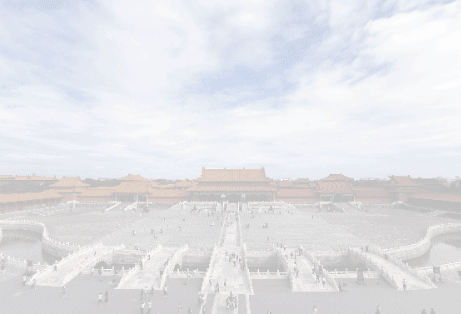
Located in the south-west of Paris, the Palace of Versailles was the principal residence of the French kings from the time of Louis XIV to that of Louis XVI. The Palace of Versailles is one of the most popular historical sites for tourists in France, and is famous for its building and garden design, as well as the representation of French cultural and royal history. It was listed as a UNESCO World Heritage Site in 1979.
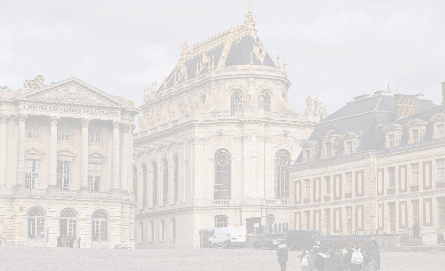

The Palace Museum and the Palace of Versailles have witnessed the history of the two countries for hundreds of years.
Since the establishment of diplomatic ties between China and France in 1964, the two museums have witnessed unforgettable moments of people-to-people and cultural exchanges, serving a bond of mutual learning and in-depth exchanges between the two countries.
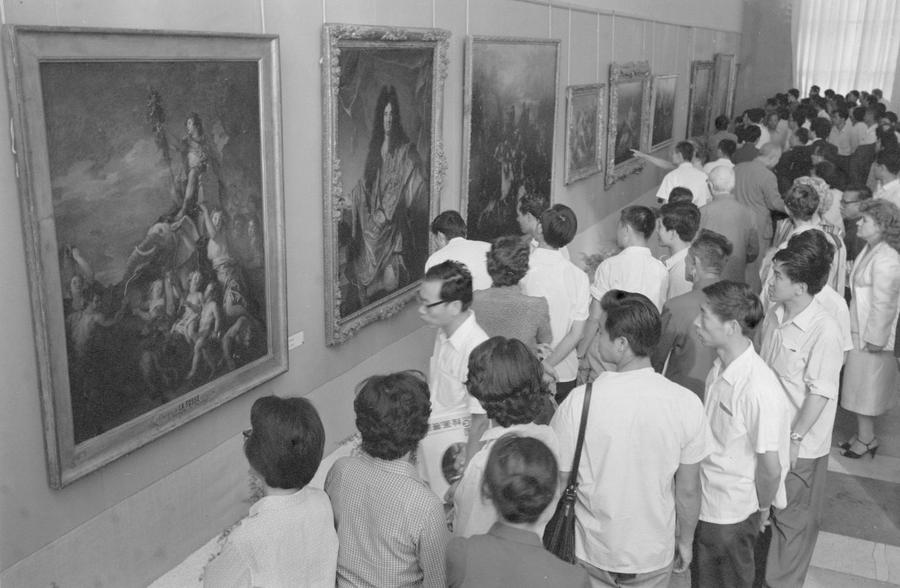 This file photo shows people viewing artworks collected by the Palace of Versailles on exhibition at Beijing Exhibition Center in Beijing, capital of China. The exhibition started on Sept. 15, 1982. (Xinhua/Yang Shenhe)
This file photo shows people viewing artworks collected by the Palace of Versailles on exhibition at Beijing Exhibition Center in Beijing, capital of China. The exhibition started on Sept. 15, 1982. (Xinhua/Yang Shenhe)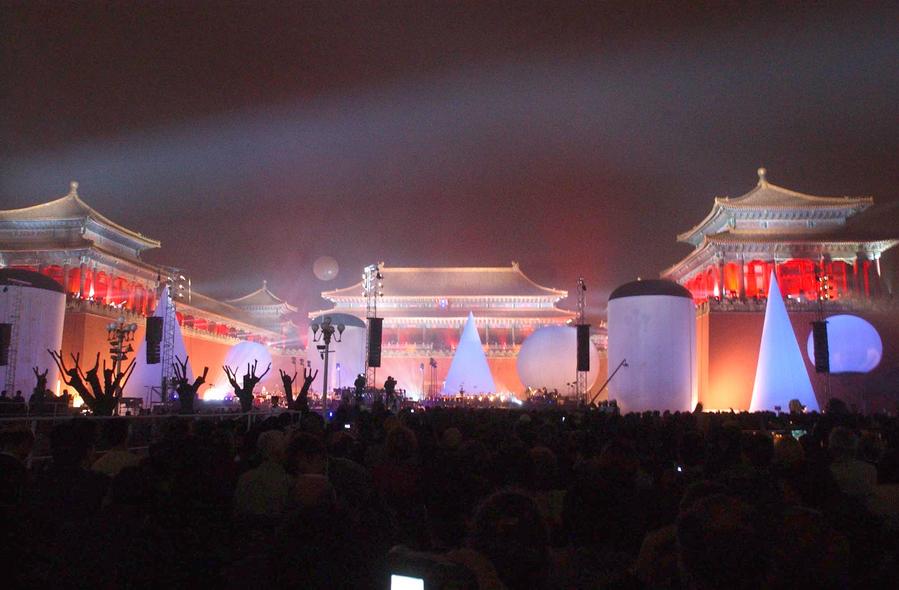 A concert of French music composer Jean-Michel Jarre is held at the Palace Museum in Beijing, capital of China, Oct. 10, 2004. (Xinhua/Wang Chengxuan)
A concert of French music composer Jean-Michel Jarre is held at the Palace Museum in Beijing, capital of China, Oct. 10, 2004. (Xinhua/Wang Chengxuan)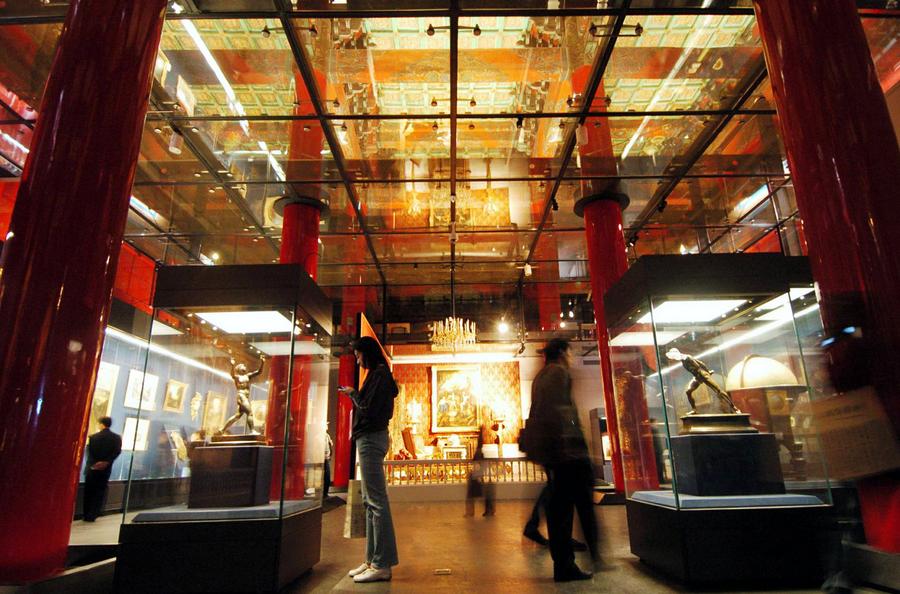 Visitors view an exhibition of collections from the Palace of Versailles in Beijing, capital of China, April 21, 2005. (Xinhua/Wang Jianhua)
Visitors view an exhibition of collections from the Palace of Versailles in Beijing, capital of China, April 21, 2005. (Xinhua/Wang Jianhua)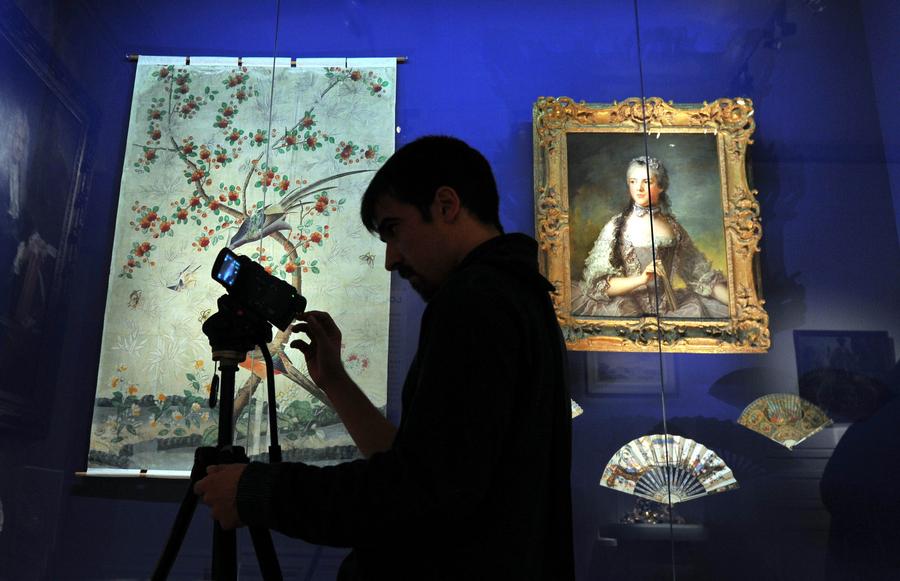 A visitor views an exhibition marking the 50th anniversary of diplomatic relations between China and France at the Palace of Versailles in Paris, France, May 26, 2014. (Xinhua/Chen Xiaowei)
A visitor views an exhibition marking the 50th anniversary of diplomatic relations between China and France at the Palace of Versailles in Paris, France, May 26, 2014. (Xinhua/Chen Xiaowei)A child experiences a game of riding in the Palace of Versailles during an exhibition in Shanghai, east China, March 12, 2021. A China itinerant exhibition of the Palace of Versailles is held at Xintiandi commercial complex in Shanghai, during which digital technologies and interactive activities offer people the unique experience of visiting the palace. (Xinhua/Fang Zhe)
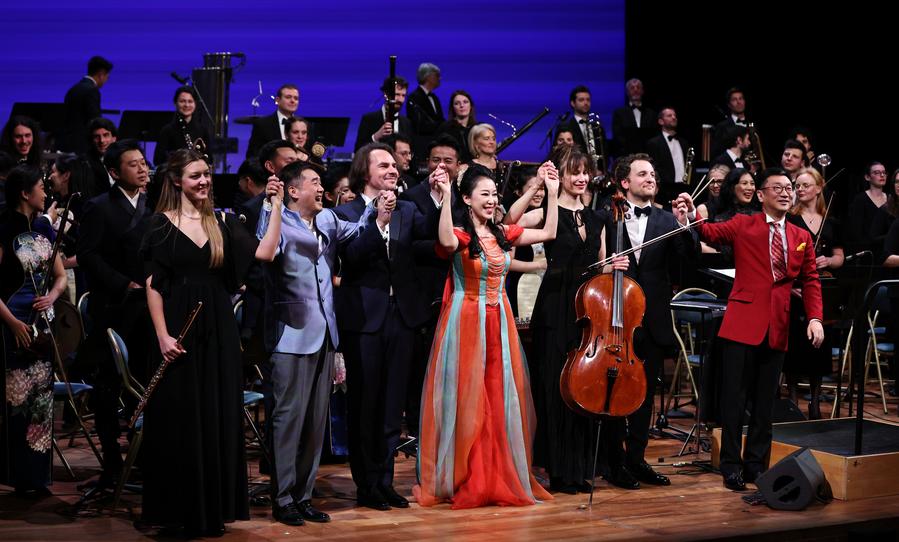 Actors greet the audience during a concert celebrating the 60th anniversary of diplomatic relations between China and France and the China-France Year of Culture and Tourism in the Palace of Versailles, France, Jan. 31, 2024. (Xinhua/Gao Jing)■
Actors greet the audience during a concert celebrating the 60th anniversary of diplomatic relations between China and France and the China-France Year of Culture and Tourism in the Palace of Versailles, France, Jan. 31, 2024. (Xinhua/Gao Jing)■












